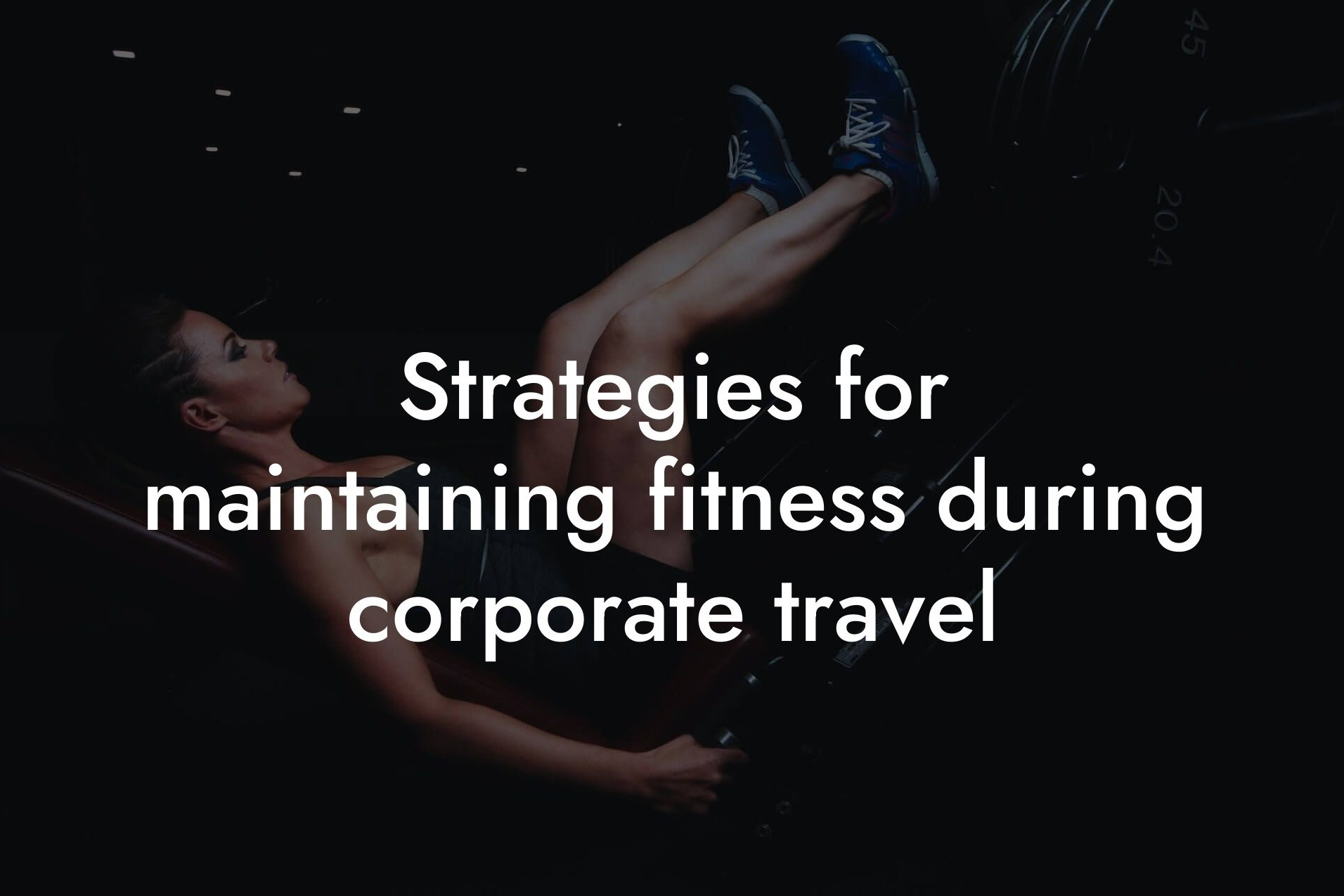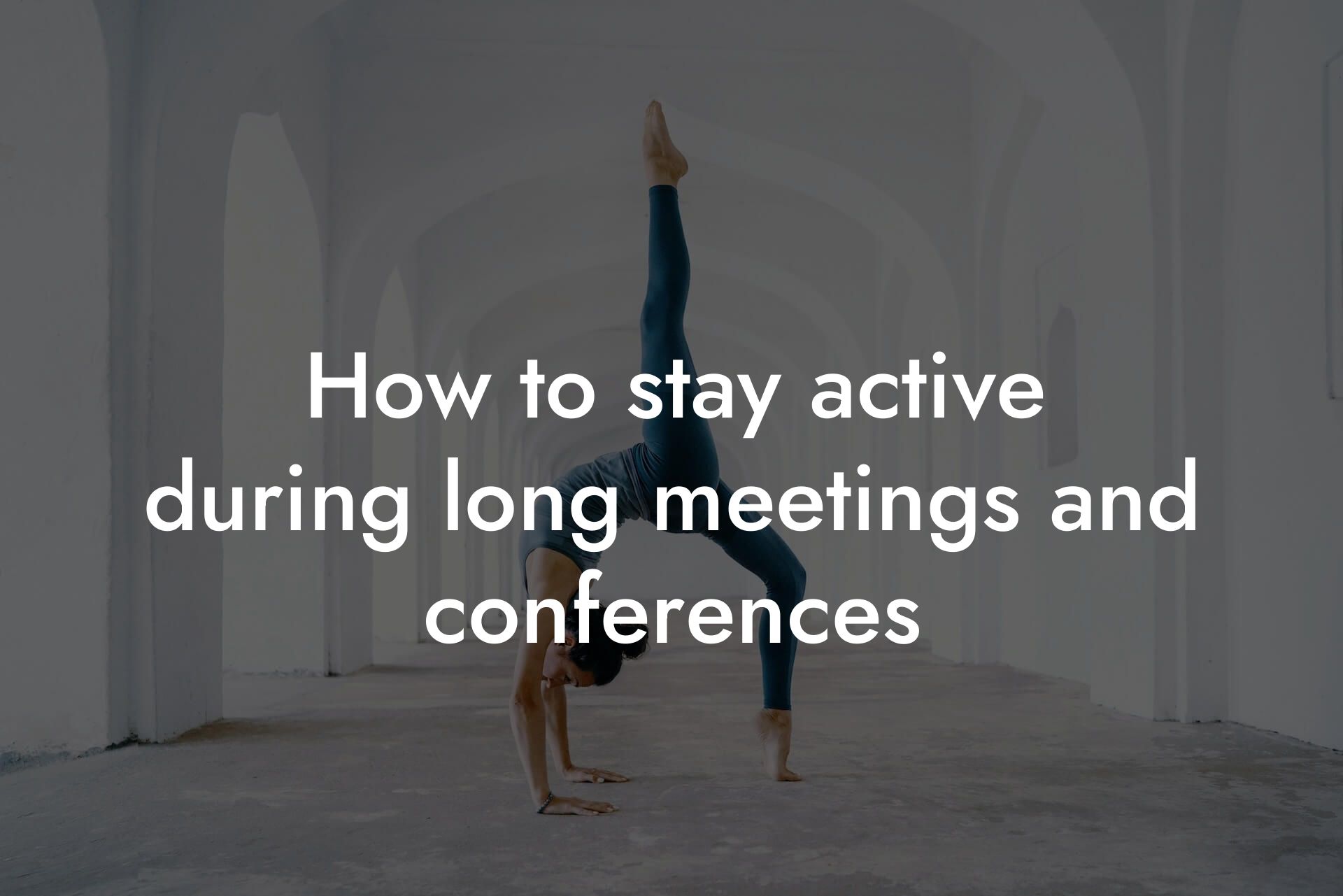As high-earning professionals, you understand the importance of maintaining a healthy work-life balance to achieve success in your careers. While many focus on developing their professional skills, few recognize the significant impact that physical fitness can have on career progression in management. In this article, we'll explore the connection between fitness and career advancement, and how incorporating a fitness routine can take your business to the next level.
Table of Contents
- The Science Behind Fitness and Productivity
- Fitness and Confidence: A Key to Career Advancement
- The Impact of Fitness on Stress Management
- Fitness and Networking Opportunities
- The Role of Fitness in Building Resilience
- Fitness and Time Management
- The Connection Between Fitness and Leadership
- Integrating Fitness into Your Busy Management Schedule
- Frequently Asked Questions
The Science Behind Fitness and Productivity
Research has consistently shown that regular exercise improves cognitive function, boosts energy levels, and enhances overall mental well-being. When you're physically fit, you're more likely to be productive, focused, and efficient in your work. This is because exercise increases the production of neurotransmitters like dopamine and serotonin, which regulate motivation, concentration, and mood. In a management role, being able to stay focused and motivated is crucial for making informed decisions, leading teams, and driving business growth.
Fitness and Confidence: A Key to Career Advancement
Physical fitness is closely linked to confidence, which is a critical trait for career advancement in management. When you feel good about your physical appearance and capabilities, you're more likely to exude confidence in your professional life. This confidence can lead to increased assertiveness, better communication, and more effective leadership. In a competitive business environment, confidence can be the differentiator between success and stagnation.
The Impact of Fitness on Stress Management
Management roles are often accompanied by high levels of stress, which can negatively impact physical and mental health. Exercise is a natural stress-reliever, and regular physical activity can help reduce anxiety and depression. By incorporating fitness into your routine, you can better manage stress, make more informed decisions, and maintain a clearer head in high-pressure situations.
Fitness and Networking Opportunities
Fitness provides a unique opportunity to network and build relationships with like-minded professionals. Joining a fitness community, participating in charity runs, or attending fitness events can help you connect with others who share similar interests and values. These connections can lead to valuable business opportunities, mentorship, and access to new markets and industries.
The Role of Fitness in Building Resilience
Resilience is a critical trait for managers, as it enables them to adapt to changing circumstances, overcome obstacles, and maintain a positive outlook in the face of adversity. Fitness helps build resilience by teaching individuals to push beyond their limits, develop coping strategies, and focus on long-term goals. By incorporating fitness into your routine, you can develop the mental and physical toughness needed to navigate the challenges of a management role.
Fitness and Time Management
One of the most significant challenges of incorporating fitness into a busy management schedule is finding the time. However, exercise can actually help improve time management skills by teaching individuals to prioritize tasks, set realistic goals, and maintain a sense of discipline. By committing to a regular fitness routine, you can develop the skills needed to manage your time more effectively, leading to increased productivity and better work-life balance.
The Connection Between Fitness and Leadership
Effective leaders inspire and motivate their teams, and physical fitness can play a significant role in this process. When managers prioritize their own fitness, they set a positive example for their teams, demonstrating the importance of self-care, discipline, and hard work. This can lead to increased team morale, motivation, and productivity, ultimately driving business growth and success.
Integrating Fitness into Your Busy Management Schedule
As a busy manager, it can be challenging to find time for fitness. However, there are several strategies you can use to incorporate physical activity into your schedule. Consider waking up earlier for a morning workout, using your lunch break for a quick exercise session, or finding a fitness routine that can be done in the comfort of your own home. At Tano Performance Group, we offer comprehensive body assessments using our state-of-the-art DEXA machine, providing you with the insights you need to optimize your fitness routine and take your business to the next level.
By recognizing the connection between fitness and career progression in management, you can take the first step towards achieving your goals. By incorporating physical activity into your routine, you can improve your productivity, confidence, stress management, and leadership skills, ultimately driving business growth and success. Remember, fitness is not just about physical appearance; it's about becoming the best version of yourself, both personally and professionally.
Frequently Asked Questions
What is the connection between fitness and career progression in management?
Research has shown that there is a strong correlation between physical fitness and career advancement in management. Physically fit individuals tend to have more energy, better focus, and enhanced cognitive function, all of which are essential qualities for success in management roles. Moreover, regular exercise has been linked to improved time management, communication skills, and leadership abilities, making fit individuals more attractive to employers and better equipped to handle the demands of management positions.
How does regular exercise improve cognitive function?
Exercise has been shown to increase blood flow to the brain, leading to improved cognitive function, including enhanced memory, concentration, and problem-solving skills. Regular physical activity also promotes the growth of new neurons and forms new neural connections, further improving cognitive abilities. Additionally, exercise has been linked to reduced stress and anxiety levels, which can impede cognitive function.
Can being overweight or obese hinder career progression?
Unfortunately, yes. Research has shown that being overweight or obese can negatively impact career advancement, particularly in management roles. Excess weight can lead to decreased energy levels, reduced mobility, and increased absenteeism, all of which can impact job performance and opportunities for advancement. Moreover, societal biases and stereotypes may also play a role, with overweight or obese individuals being perceived as less capable or less professional.
How can I fit exercise into my busy management schedule?
It can be challenging to prioritize exercise when you have a demanding management role, but it's not impossible. Try breaking up your exercise routine into shorter sessions, such as 20-30 minutes, and schedule them into your daily planner. You can also explore exercise options that can be done at your desk, such as chair yoga or desk stretches. Additionally, consider delegating tasks or adjusting your work schedule to allow for more time for exercise.
What types of exercise are most beneficial for management professionals?
Aerobic exercise, such as running, cycling, or swimming, is excellent for improving cardiovascular health and increasing energy levels. Resistance training, such as weightlifting or bodyweight exercises, can help improve strength and endurance. High-intensity interval training (HIIT) is also beneficial for improving time management and focus. Ultimately, the best exercise is one that you enjoy and can commit to regularly.
How does exercise impact stress levels in management professionals?
Exercise is a natural stress-reliever and can help reduce anxiety and depression symptoms. Physical activity stimulates the production of endorphins, which are natural mood-boosters. Regular exercise can also improve sleep quality, which is essential for managing stress. Additionally, exercise provides a healthy distraction from work-related stress and can help management professionals develop coping mechanisms for dealing with pressure.
Can exercise improve my leadership skills?
Absolutely! Exercise has been shown to improve leadership skills by increasing confidence, enhancing decision-making abilities, and promoting resilience. Physically fit leaders are also more likely to inspire and motivate their teams, leading to improved team performance and productivity. Regular exercise can also help leaders develop a growth mindset, which is essential for adapting to changing circumstances and driving innovation.
How does physical fitness impact my professional reputation?
Unfortunately, physical fitness can impact your professional reputation, particularly in management roles. Fit individuals are often perceived as more capable, confident, and professional, while those who are overweight or obese may be viewed as less capable or less competent. However, it's essential to remember that physical fitness is just one aspect of a person's overall professional reputation.
Can I still advance in my career if I'm not physically fit?
While physical fitness can be an advantage in career advancement, it's not the only factor. Many successful management professionals are not physically fit, and other qualities such as intelligence, experience, and leadership skills can still lead to career advancement. However, it's essential to recognize the importance of physical fitness in overall well-being and to prioritize it for personal and professional reasons.
How can I prioritize self-care as a busy management professional?
Prioritizing self-care is essential for maintaining physical and mental well-being. Schedule time for exercise, meditation, and relaxation, and treat it as non-negotiable. Learn to say "no" to non-essential tasks and delegate when possible. Also, prioritize sleep and aim for 7-8 hours per night. Finally, make time for activities that bring you joy and fulfillment outside of work.
What are some common barriers to exercise for management professionals?
Common barriers to exercise for management professionals include lack of time, energy, and motivation. Additionally, work-related travel, long hours, and high levels of stress can make it challenging to prioritize exercise. It's essential to identify these barriers and develop strategies to overcome them, such as finding exercises that can be done on the go or scheduling exercise into your daily planner.
How can I stay motivated to exercise regularly?
Staying motivated to exercise regularly can be challenging, but there are several strategies that can help. Find an exercise buddy or accountability partner to provide support and encouragement. Set specific, achievable goals and reward yourself when you reach them. Vary your exercise routine to avoid boredom and prevent plateaus. Finally, focus on the benefits of exercise, such as improved energy and mood, to maintain motivation.
Can exercise improve my communication skills?
Yes, exercise has been shown to improve communication skills by increasing confidence, enhancing cognitive function, and promoting better listening skills. Physically fit individuals are also more likely to be more articulate and persuasive, making them more effective communicators.
How does physical fitness impact my ability to handle stress?
Physical fitness has a profound impact on our ability to handle stress. Regular exercise reduces stress and anxiety levels, improves mood, and enhances cognitive function, making it easier to manage stress. Additionally, exercise provides a healthy distraction from work-related stress and can help management professionals develop coping mechanisms for dealing with pressure.
Can I still be successful in management if I have a disability or chronic illness?
Absolutely! While physical fitness can be an advantage in management roles, it's not the only factor. Many successful management professionals have disabilities or chronic illnesses, and other qualities such as intelligence, experience, and leadership skills can still lead to career advancement. It's essential to focus on abilities rather than limitations and to prioritize accommodations and support when needed.
How can I incorporate physical activity into my daily routine?
Incorporating physical activity into your daily routine can be as simple as taking the stairs instead of the elevator, going for a short walk during lunch, or doing a few jumping jacks during commercial breaks. You can also try desk exercises, such as chair squats or desk push-ups, to get your blood flowing and energy levels up.
What are some common myths about exercise and management professionals?
One common myth is that exercise is a luxury that management professionals can't afford. Another myth is that exercise has to be intense and time-consuming to be effective. Finally, some people believe that exercise is only for young people, and that older management professionals can't benefit from physical activity. These myths are all false, and exercise can be adapted to fit any schedule, age, or fitness level.
How can I prioritize physical fitness in a high-pressure management role?
Prioritizing physical fitness in a high-pressure management role requires commitment and creativity. Schedule exercise into your daily planner and treat it as non-negotiable. Find exercises that can be done on the go or during breaks, and consider delegating tasks or adjusting your work schedule to allow for more time for exercise. Finally, focus on the benefits of exercise, such as improved energy and focus, to maintain motivation.
Can exercise improve my creativity and innovation?
Yes, exercise has been shown to improve creativity and innovation by increasing blood flow to the brain, promoting new neural connections, and enhancing cognitive function. Physically fit individuals are also more likely to be more open-minded, adaptable, and resilient, all of which are essential qualities for driving innovation.
How does physical fitness impact my work-life balance?
Physical fitness has a profound impact on work-life balance. Regular exercise can improve energy levels, reduce stress, and enhance cognitive function, making it easier to manage work and personal responsibilities. Additionally, exercise provides a healthy distraction from work-related stress and can help management professionals develop coping mechanisms for dealing with pressure.
Can I still prioritize physical fitness if I have a busy travel schedule?
Absolutely! Prioritizing physical fitness while traveling can be challenging, but it's not impossible. Pack exercise gear, such as resistance bands or a yoga mat, and find exercises that can be done in a hotel room or during breaks. You can also explore local fitness options, such as gyms or fitness classes, to stay active while on the go.
Here are some related articles you might love...
- Strategies for maintaining fitness during corporate travel
- How to stay active during long meetings and conferences
- Nutrition tips for staying sharp in the corporate world
- The impact of body composition on team leadership
- How DEXA scans can help managers optimize their health
- The importance of physical health in effective management
- How to lead by example with physical fitness
- Balancing work and fitness: Tips for corporate leaders
- How corporate managers can incorporate fitness into their daily routines
Zak Faulkner
Zak Faulkner is a leading authority in the realm of physical health and body composition analysis, with over 15 years of experience helping professionals optimise their fitness and well-being. As one the experts behind Tano Performance Group, Zak has dedicated his career to providing in-depth, science-backed insights that empower clients to elevate their physical performance and overall health.
With extensive knowledge of DEXA technology, Zak specializes in delivering comprehensive body assessments that offer precise data on body fat, muscle mass, bone density, and overall physique. His expertise enables individuals to make informed decisions and achieve their fitness goals with accuracy and confidence. Zak’s approach is rooted in a deep understanding of human physiology, combined with a passion for helping clients unlock their full potential through personalised strategies.
Over the years, Zak has earned a reputation for his commitment to excellence, precision, and client-focused service. His guidance is trusted by top professionals who demand the best when it comes to their health. Whether advising on fitness programs, nutritional strategies, or long-term wellness plans, Zak Faulkner’s insights are a valuable resource for anyone serious about taking their health and fitness to the next level.
At Tano Performance Group, Zak continues to lead our Content Team revolutionising how professionals approach their physical health, offering unparalleled expertise that drives real results.




